河北省临漳县第一中学高中英语必修二学案第五单元
高中英语:Unit5 Vocabulary and Useful Expressions教案(新人教版必修2)河北地区专用
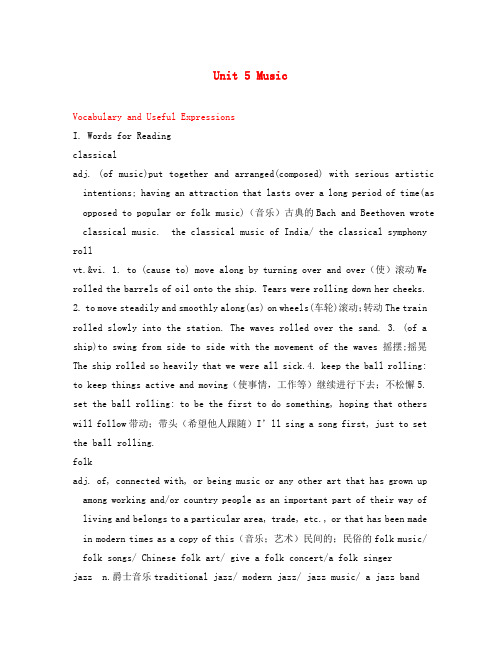
Unit 5 MusicVocabulary and Useful ExpressionsI. Words for Readingclassicaladj. (of music)put together and arranged(composed) with serious artistic intentions; having an attraction that lasts over a long period of time(as opposed to popular or folk music)(音乐)古典的Bach and Beethoven wrote classical music. the classical music of India/ the classical symphony rollvt.&vi. 1. to (cause to) move along by turning over and over(使)滚动We rolled the barrels of oil onto the ship. Tears were rolling down her cheeks.2. to move steadily and smoothly along(as) on wheels(车轮)滚动;转动The train rolled slowly into the station. The waves rolled over the sand.3. (of a ship)to swing from side to side with the movement of the waves摇摆;摇晃The ship rolled so heavily that we were all sick.4. keep the ball rolling: to keep things active and moving(使事情,工作等)继续进行下去;不松懈5. set the ball rolling: to be the first to do something, hoping that others will follow带动;带头(希望他人跟随)I’ll sing a song first, just to set the ball rolling.folkadj. of, connected with, or being music or any other art that has grown up among working and/or country people as an important part of their way of living and belongs to a particular area, trade, etc., or that has been made in modern times as a copy of this(音乐;艺术)民间的;民俗的folk music/ folk songs/ Chinese folk art/ give a folk concert/a folk singerjazz n.爵士音乐traditional jazz/ modern jazz/ jazz music/ a jazz bandmusician n.音乐家a fine musiciandreamn. 1. a group of thoughts, images, or feelings experienced during sleep梦 2. sth. imaged, not real, but believed in or greatly and hopefully desired理想;梦想 v.梦见;梦想dream of/about (doing) sth./ dream a dreamclapvi. 鼓掌Clap one’s hand in time to the music/ clap sb. on sth./ clap sb. on the back/clap eyes on sb.be honest with = be frank with/ to tell you the truthformvt.&n.(使)组成;形成form some ideas or opinion about sth./ form a nation/ form a line/ form good habits/ in the form of/ in form/ fill in the form/ take the form ofpasser-by n. 过路人;行人passers-by/ ask the passer-byearnvt. 1. to get (money) by working赚;挣(钱)He earns $10000 a year(by writing stories).2.to get(sth. that one deserves)because of one’s qualities博得;赢得He earned the title of “The Great” by his victories in the war. earn money/ earn one’s living / earn sb. successloosely adv. 宽松的;松散的loosely speaking/ loosely translated advertisementn. also ad--a notice of sth. for sale, service offered, job position to be filled, room to let, etc., as in a newspaper, painted on a wall, or made as a film广告the advertisement page/ advertisement for sb./sth./ put an advertisementactor n. 男演员;行动者actor and actress/ an excellent actorattractiveadj. having the power to attract有吸引力的The idea is very attractive. sound attractive/ at attractive pricefann. 1. 扇子turn the fan on 2. a very keen follower or supporter, as of a sport, performing art, or famous person迷;狂热者fan clubinstrumentn. 工具;器械;乐器play an instrument/ the instruments of the orchestra/ a ship’s instrumentsII. Words for Learning about Languagehitn. (演出等)成功;打击a direct hit on an enemy ship/ a final score of two hits and six misses/ a hit with everyone/ His film is quite a hit/ They sang their latest hit./ make a hitsortn.& vt. 种类;类别;分类;整理the sort of person I really dislike/ What sort of paint are you using?/ sort sth. out (into) sth./ sort through sth.III. Words for Using Languageafterwardsadv. later; after that以后;后来Let’s go to the theatre first and eat afterwards.performvt.& vi. 1. to do; carry out(a piece of work)实行;做The doctor performed the operation. 2. to fulfill (a promise, order, etc.) 履行;执行(允诺,命令)3. to give, act or show(a play, a part(role)in a play, a piece of music, tricks, etc.) esp. before the public表演 perform a task/ perform one’s duty/ perform an operation to save one’s life/ perform the piano/perform skillfully on the flute/ perform live on television/ perform a ceremony performancen.表演;履行faithful in the performance of one’s duty/ the evening performance/give a performance of “Hamlet”/ in performancestickvi 1. to (cause to) be fixed with a sticky substance粘贴;张贴Stick a piece of paper over the old address and write the new one on it. stick to one’s fingers/ stick a stamp on a letter 2. stick to: to refuse to leave or change/stick up a note on the note-board/ stick the pen behind the ear 坚持;固守stick to one’s plan/to stick to one’s promiseabilityn. power and skill, esp. to do, think, act, make, etc.(尤指工作, 思考,行动,创造等)能力 a machine with the ability to copy with large loads/ have the ability to do the work/ a woman of great ability/ have a great musical abilitysayingn. 话;俗话‘More haste, less speed,’ as the saying goes.reputationn. (an) opinion held by others(about someone or sth.); the degree to which one is well thought of名誉;名声: a school with an excellent reputation/ a good reputation as a doctor/ have a reputation for laziness/ ruin sb.’s reputation/ make a reputation for oneself/ live up to one’s reputationunknownadj.& n. 不知道的;未知的人或物 unknown forces/ an unknown actor/ unknown to sb./ a journey into the unknown。
高中英语必修二5单元教案
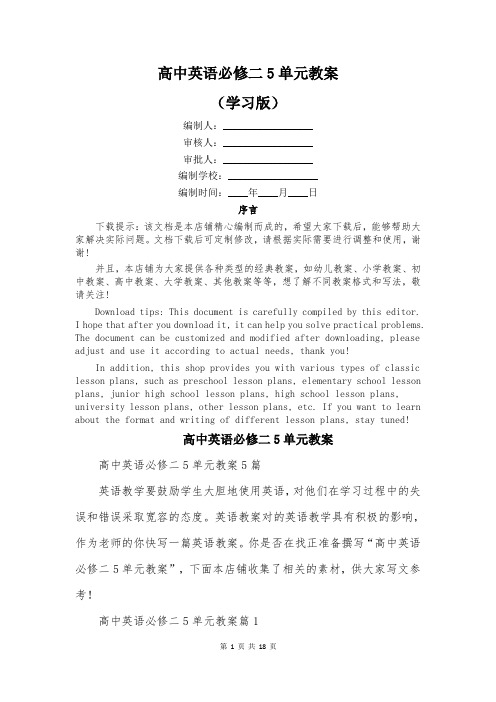
高中英语必修二5单元教案(学习版)编制人:__________________审核人:__________________审批人:__________________编制学校:__________________编制时间:____年____月____日序言下载提示:该文档是本店铺精心编制而成的,希望大家下载后,能够帮助大家解决实际问题。
文档下载后可定制修改,请根据实际需要进行调整和使用,谢谢!并且,本店铺为大家提供各种类型的经典教案,如幼儿教案、小学教案、初中教案、高中教案、大学教案、其他教案等等,想了解不同教案格式和写法,敬请关注!Download tips: This document is carefully compiled by this editor.I hope that after you download it, it can help you solve practical problems. The document can be customized and modified after downloading, please adjust and use it according to actual needs, thank you!In addition, this shop provides you with various types of classic lesson plans, such as preschool lesson plans, elementary school lesson plans, junior high school lesson plans, high school lesson plans, university lesson plans, other lesson plans, etc. If you want to learn about the format and writing of different lesson plans, stay tuned!高中英语必修二5单元教案高中英语必修二5单元教案5篇英语教学要鼓励学生大胆地使用英语,对他们在学习过程中的失误和错误采取宽容的态度。
北省邯郸市临漳县一中高二英语新人教必修5导学案:Unit 5《First Aid》Period Period Three Using Language
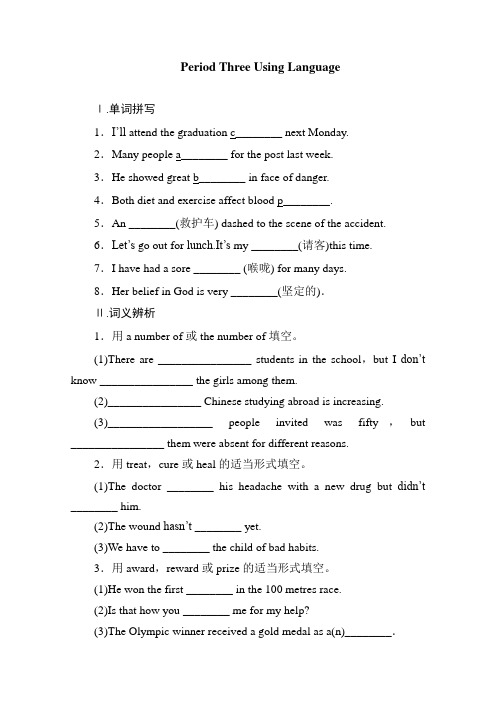
Period Three Using LanguageⅠ.单词拼写1.I’ll attend the graduation c________ next Monday.2.Many people a________ for the post last week.3.He showed great b________ in face of danger.4.Both diet and exercise affect blood p________.5.An ________(救护车) dashed to the scene of the accident.6.Let’s go out for lunch.It’s my ________(请客)this time.7.I have had a sore ________ (喉咙) for many days.8.Her belief in God is very ________(坚定的).Ⅱ.词义辨析1.用a number of或the number of填空。
(1)There are ________________ students in the school,but I don’t know ________________ the girls among them.(2)________________ Chinese studying abroad is increasing.(3)__________________ people invited was fifty,but ________________ them were absent for different reasons.2.用treat,cure或heal的适当形式填空。
(1)The doctor ________ his headache with a new drug but didn’t ________ him.(2)The wound hasn’t ________ yet.(3)We have to ________ the child of bad habits.3.用award,reward或prize的适当形式填空。
河北省高一英语必修2 Unit5《Music》全套教案
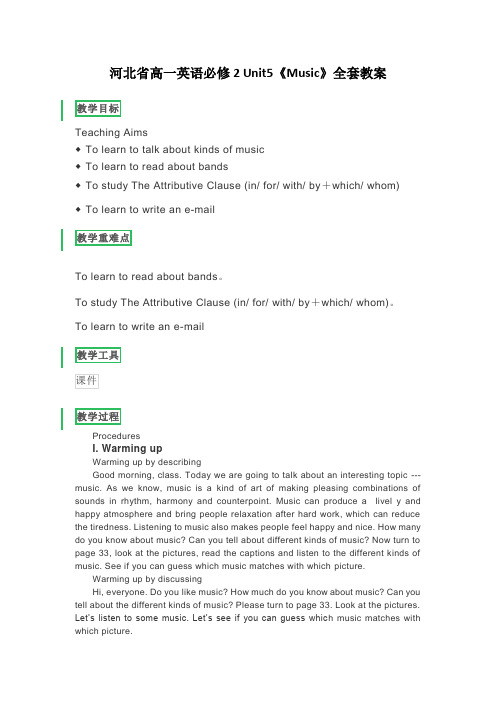
河北省高一英语必修2 Unit5《Music》全套教案教学目标Teaching Aims◆To learn to talk about kinds of music◆To learn to read about bands◆To study The Attributive Clause (in/ for/ with/ by+which/ whom)◆To learn to write an e-mail教学重难点To learn to read about bands。
To study The Attributive Clause (in/ for/ with/ by+which/ whom)。
To learn to write an e-mail教学过程ProceduresI. Warming upWarming up by describingGood morning, class. Today we are going to talk about an interesting topic --- music. As we know, music is a kind of art of making pleasing combinations of sounds in rhythm, harmony and counterpoint. Music can produce a livel y and happy atmosphere and bring people relaxation after hard work, which can reduce the tiredness. Listening to music also makes people feel happy and nice. How do you know about music? Can you tell about different kinds of music? Now turn to page 33, look at the pictures, read the captions and listen to the different kinds of music. See if you can guess which music matches with which picture.Warming up by discussingHi, everyone. Do you like music? How much do you know about music? Can tell about the different kinds of music? Please turn to page 33. Look at the pictures. Let’s listen to some music. Let’s see if you can guess whic h music matches with which picture.Yes, you are right. I’m sure you will really enjoy yourselves after listening to all these beautiful music. What kind of music do you like better, Chinese or Western, classical or modern? Why? How does music make you feel? Why do you like to listen to music? Let’s discuss these questions in small groups. Try to share your opinions with one another.II. Pre-reading1.Thinking and sayingHave you heard about any of the famous bands in the world? List some if you can.Fo r reference: I’ve heard about “The Beatles”, “Back Street Boys”, “The Eagles”, “West life” and “Pink Floyd”.2.Listening, talking and sharingLet’s listen to some pieces of music from different bands. Work in groups of four. Tell your group mates which band you like best. Why? Then the group leader is to stand up and share the group idea with the class.For reference: I am from Group 1. Our group likes “The Beatles” best. We like their style of performances. Listening to their performances, we will feel re laxed, amused, and their performances make us think a lot about life.Do you know anything about “The Monkees”?For reference: “The Monkees” is a band that was first popular in the 1960s in America. Unlike most bands of the time, the Monkees were not formed by its members but rather by TV producers. They were a fictional band in the TV show of the same name. The band was composed of Mike Nesmith, Mickey Dolenz, Davy Jones, and Peter Tork. All the members had some musical experience. Let’s come to the reading --- The Band That Wasn’t and find more about them.III. Reading1.Reading aloud to the recordingNow please listen and read aloud to the recording of the text THE BAND THAT WASN’T. Pay attention to the pronunciation of each word and the pauses within each sentence. I will play the tape twice and you shall read aloud twice, too.2.Reading and underliningNext you are to read and underline all the useful expressions or collocations in the passage. Copy them to your notebook after class as homework.Collocat ions from THE BAND THAT WASN’Tdream of doing , at a concert , with sb. clapping and enjoying …, sing karaoke , be honest, form a band, high school students, practice one’s music, first step to fame, play to passers-by, in the subway, earn some extra money, give performances in pubs or clubs , be paid in cash, make records in a studio, begin as a TV show, play jokes on…, be based loosely on…, the TV organizers, put an advertisement in a newspaper, look for rock musicians, rely on , pretend to do sth., beco me more serious about…, play their own instruments, produce one’s own records, start touring, break up, in the mid-1980s,celebrate one’s time as a real band3.Reading to identify the topic sentence of each paragraphSkim the text and identify the topic sentence of each paragraph. You may find it either at the beginning, the middle or the end of the paragraph.1st paragraph: Many people want to be famous as singers or musicians.2nd paragraph: This is how most bands start.3rd paragraph: The Monkees started in a different way.4th paragraph: How the Monkees became popular and how they developed asa real band.3.Reading and transferring informationRead the text again to complete the tables, which list how people formed a band and how The Monkees was formed by the TV organizers and became a real band.How do people get to form a band?How was The Monkees formed and became a real band?4. Readin g and understanding difficult sentencesAs you have read the text times, you can surely tell which sentences are difficult to understand. Now put your questions concerning the difficult points to me.IV. Closing downClosing down by doing exercisesTo end the lesson you are to do the comprehending exercises No. 1, 2, 3 and 4.Closing down by having a discussionDo you think the TV organizers were right to call “The Monkees” a band when they did not sing or write their own songs? Why?For reference: I don’t think the TV organizers were right to call “The Monkees”a band when they did not sing or write their own songs because singing and writing its own songs was the basis of a band.Do you agree that th e j okes were more important than the music for this band? Give a reason.For reference: Yes. I think it is the jokes that really attract more fans.No. I think the purpose of forming a band is getting people to enjoy the spirit of music. It’s more important than playing jokes just to make people laugh.Closing down by retelling the form of the band The Monkees.I shall write some key words and expressions on the board. You are to retell the form of the band according to these words.For reference: begin as a TV show, the TV organizers, look for, put an advertisement in a newspaper, use actors for the other members of the band, pretend to singPeriod 2: Learning about LanguageTeaching AimsTo help students learn about the Attributive Clause with a preposition in front.To help students discover and learn to use some useful words and expr essions.To help students discover and learn to use some useful structures.ProceduresI. Warming upWarming up by discovering useful words and expressionsTurn to page 36 and do exercises 1, 2 and 3 first. Check your answers against your classmates’.II. Learning about grammar1.Reading and thinkingTurn to page 34 and read with me the text of THE BAND THAT WASN’t. As you read on, pay attention to The Attributive Clause (in/ for/ with/ by+which/ whom), that is, the attributive clauses with a preposition ahead of the relative pronoun shown in the sentences.For reference: The musicians of whom the band was formed played jokes on each other as well as played music. However, after a year or so in which they became more serious about their work, “The Monkees” started to play their own instruments and write their own songs like a real band.2.Doing exercise 2 on page 37Turn to page 34. Look at the sentence in the text:However, after a year or so in which they became more serious about their work, “The Monkees” started to play and sing their own songs like a real band.Pay attention to the structure: preposition + relative pronoun. Usually only two relative pronouns --- which and whom--- can be used in the Attributive Clause, with a preposition put before the clause. That can’t be used. Look at the screen. Here are more examples on this kind of structure.1.This is the reason for which he left his hometown. (=why)2.I’ll never forget the day on which we stayed together. (=when)3.This is the girl from whom I learned the news.4.The person to whom I spoke just now is the manager that I told you about.5.I’ll show you a store in which you may buy all that you need.(=where)6.I don’t like the way in which you laughed at her.(=that)Now go on to do Exercise 3 on page 37, that is, to sort out the sentences.III. Ready used materials for The Attributive Clause (in/ for/ with/ by+which/ whom)In formal styles we often put a preposition before the relative pronouns which and whom:oThe rate at which a material heats up depends on its chemical composition.oIn the novel by Peters, on which the film is based, the main character is a teenager.oAn actor with whom Gelson had previously worked contacted him about the role.oHer many friends, among whom I like to be considered, gave her encouragement.Notice that after a preposition you can’t use who in place of whom, and you can’t use that or zero relative pronoun either:oIs it right that politicians should make important decisions without consulting the public to whom they are accountable? (not --- the public to who they are accountable.)oThe valley in which the town lies is heavily polluted. (not --- The valley in that the town...)oArnold tried to gauge the speed at which they were traveling. (not --- the speed at they were traveling.)In informal English we usually put the preposition at the end in attributive clauses rather than at the beginning:oThe office which Graham led the way to was filled with books.oJim’s footballing ability, which he was noted for, had been encouraged by his parents.oThe playground wasn’t used by those chi ldren who it was built for.In this case we prefer who rather than whom (although whom is used in formal contexts). In restrictive attributive clauses we can also use that or zero relative pronoun instead of who or which (e.g. ...the children (that) it was built for).If the verb in attributive clauses is a two-or-three-word verb (e.g. come across, fill in, go through, look after, look up to, put up with, take on) we don’t usually put the preposition at the beginning:o Your essay is one of those (which/tha t) I’ll go through tomorrow. (rather than...through which I’ll go tomorrow.)o She is one of the few people (who/that) I look up to. (not ... to whom I look up.)In formal written English, we often prefer to use of which rather than whose to talk about things:oA huge amount of oil was spilled, the effects of which are still being felt. (or...whose effects are still being felt.)oThe end of the war, the anniversary of which is on the 16th of November, will be commemorated in cities throughout the country. (or...whose anniversary is on...) Note that we can’t use of which in place of whose in the patterns described in Unit 71B:oDorothy was able to switch between German, Polish and Russian, all of which she spoke fluently. (not..,all whose she spoke...)We can sometimes use that...of in place of of which. This is less formal than of which and whose, and is mainly used in spoken English:oThe school that she is head of is closing down. (or The school of which she is head...)Whose can come after a preposition in attributive clauses. However, it is more natural to put the preposition at the end in less formal contexts and in spoken English:oWe were grateful to Mr. Marks, in whose car we had traveled home. (or...whose car we had traveled home in.)oI now turn to Freud, from whose work the following quotation is taken. (or...whose work the following quotation is taken from.)IV. Closing down by doing exercises:Join the sentence halves using which or whom after an appropriate preposition.(A)a. I would never have finished the work.b. It was primarily written.c. We know nothing.d. They got a good view.e. He learned how to play chess.f. Dennis scored three goals in the final.g. She was born.h. It was discovered.1.They climbed up to the top of a large rock.2. I would like to thank my tutor.3. She has now moved back to the house on Long Island.4. The star is to be named after Patrick Jenks.S. This is the ball.6. He is now able to beat his father.7. The book is enjoyed by adults as well as children.8. There are still many things in our solar system.Key for reference:1.They climbed up to the top of a large rock, from which they got a good view.2. I would like to thank my tutor, without whom I would never have finished the work.3. She has now moved back to the house on Long Island, in which she was born.4. The star is to be named after Patrick Jenks, by whom it was discovered.S. This is the ball. Dennis scored three goals in the final.6. He is now able to beat his father, from whom he learned how to play chess.7. The book is enjoyed by adults as well as children, about whom it was primarily written.8. There are still many things in our solar system, about which we know nothing.Are these correct or appropriate? If they are, put a√. If they are not, give a reason, correct them and give alternatives if you can. (A)I. It's a piece of jewelry across which I came in an antique shop. --- which I came across in an antique shop. (‘came across’ is a two-word verb.)2. The extra work which she took on was starting to affect her health.3. My mother, after whom I looked for over 20 years, died last year.4. The people whom I work with are all very friendly.5. Some of the criticisms with which they had to put up were very unfair.6. He had many friends with whom he had a regular correspondence.7. The woman to who he is engaged comes from Poland.8. The forms which I had to fill in were very complicated.Rewrite these sentences so that they are more appropriate for formal written English. Use preposition + which or preposition + whose, as appropriate. (B)I. Tom Sims, whose car the weapons were found in, has been arrested. Torn Sims, in whose car the weapons were found, has been arrested.2. Tom Ham, whose novel the TV series is based on, will appear in the first episode.3. Dr Jackson owns the castle whose grounds the main road passes through.4. Tessa Parsons is now managing director of Simons, the company that she was once a secretary in.5. Allowing the weapons to be sold is an action that the Government should be ashamed of.6. The dragonfly is an insect that we know very little of.Period 3: Using LanguageTeaching AimsTo read the story about Freddy and then enjoy and understand Beatles’ songs.To use the language by reading, listening, speaking and writing.ProceduresI. Warming up by listening and writingTurn to page 38 and read these exercises before listening to the tape. Then listen to the tape and finish them.II. Guided reading1. Reading and translatingRead more about FREDDY THE FROY and translate it into Chinese paragraph by paragraph.2. Reading and underliningNext you are to read and underline all the useful expressions or collocations in the passage. Copy them to your notebook after class as homework.Collocations from FREDDY THE FROGbecome famous, visit Britain on a tour, wait for hours to get tickets for the concerts, be confident, enjoy singing and all the congratulations, the most exciting experience, sing in a TV program called “Top of the Pops, wear an expensive suit, give a performance to a TV camera, go wrong, not go out without being followed everywhere, wear sunglasses, hide in railway stations, one’s personal life, become too painful for sb., pack one’s bags3. Doing exercisesNow you are going to do exercise 6 on p age 39 following the article.Suggested answers to exercise 6:This is a story about a band that became famous and did not like it.III. Guided writing1.Writing a letter for advicePlease turn to page 39 writing. Let’s read the instructions.You and your friends want to start your own band. However, you have never played in a band before. You write an e-mail to Freddy for his advice. The e-mail is started for you, but you have to finish it.You’d better do some brainstorming in small groups before writing your letters. You should follow the procedure for brainstorming and outlining introduced in Module 1 Unit 2.Writing tips:1. In groups discuss some questions you would like to ask Freddy.2. Make a list of them and choose the best questions.3. Share your ideas with another pair; discuss all questions and then decide which ones you want to ask Freddy.4. Use each question to start a new paragraph.5. Write your question first; then add extra information to show Freddy why you need help.6. Finish the letter politely and thank Freddy for his help.2.Reading Freddy’s replyLet’s read Freddy’s reply and answer the questions:--- How was Freddy’s band formed?--- What advice does Freddy give?3.Writing a note and a paragraphPlease turn to page 74. Now in pairs you are going to decide on the best way to tell a foreign friend about one kind of Chinese folk music. What do you think they need to know before they can enjoy it? Why do you like it? Who are your favorite singers? Discuss it with your partner and write notes to remind you of your most important ideas. Then write a paragraph telling your foreign friend about the type of Chinese folk music you have chosen. U se a dictionary and other reference books to help you.IV. Further applyingFinding informationGo to the library to read or get online to search in order to find more information on music and musicians. Take notes of your findings and report them to your group mates next Monday morning.V. Closing down by filling a formMake use of the text and others to fill in the form below.How do people form a bandMembersReasonsPlacesFormsResultsClosing down by describing a bandTo end this period, I am going to have two of you to describe to the class a band whom you appreciates. Who’d like to speak first?课后小结学完了这节课,你有什么收获?板书Unit 5Music。
河北省邯郸市临漳县第一中学高中英语必修五导学案Unit5FirstAidPeriodTwo
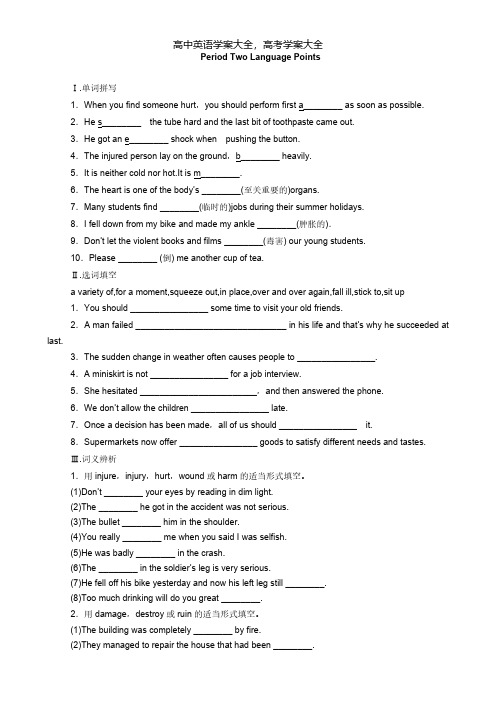
Period Two Language PointsⅠ.单词拼写1.When you find someone hurt,you should perform first a________ as soon as possible.2.He s________ the tube hard and the last bit of toothpaste came out.3.He got an e________ shock when pushing the button.4.The injured person lay on the ground,b________ heavily.5.It is neither cold nor hot.It is m________.6.The heart is one of the body’s ________(至关重要的)organs.7.Many students find ________(临时的)jobs during their summer holidays.8.I fell down from my bike and made my ankle ________(肿胀的).9.Don’t let the violent books and films ________(毒害) our young students.10.Please ________ (倒) me another cup of tea.Ⅱ.选词填空a variety of,for a moment,squeeze out,in place,over and over again,fall ill,stick to,sit up1.You should ________________ some time to visit your old friends.2.A man failed _______________________________ in his life and that’s why he succeeded at last.3.The sudden change in weather often causes people to ________________.4.A miniskirt is not ________________ for a job interview.5.She hesitated ________________________,and then answered the phone.6.We don’t allow the children ________________ late.7.Once a decision has been made,all of us should ________________ it.8.Supermarkets now offer ________________ goods to satisfy different needs and tastes.Ⅲ.词义辨析1.用injure,injury,hurt,wound或harm的适当形式填空。
人教版高中英语必修二unit5学案电子教案
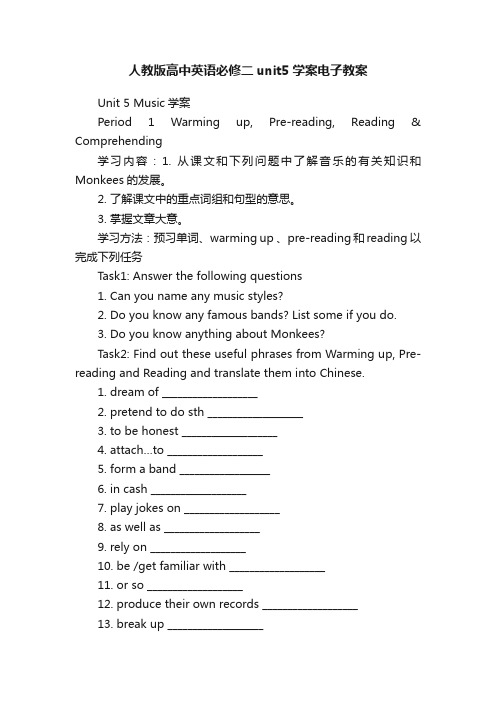
人教版高中英语必修二unit5学案电子教案Unit 5 Music学案Period 1 Warming up, Pre-reading, Reading & Comprehending学习内容:1. 从课文和下列问题中了解音乐的有关知识和Monkees的发展。
2. 了解课文中的重点词组和句型的意思。
3. 掌握文章大意。
学习方法:预习单词、warming up 、pre-reading和reading 以完成下列任务Task1: Answer the following questions1. Can you name any music styles?2. Do you know any famous bands? List some if you do.3. Do you know anything about Monkees?Task2: Find out these useful phrases from Warming up, Pre-reading and Reading and translate them into Chinese.1. dream of ___________________2. pretend to do sth ___________________3. to be honest ___________________4. attach…to ___________________5. form a band __________________6. in cash ___________________7. play jokes on ___________________8. as well as ___________________9. rely on ___________________10. be /get familiar with ___________________11. or so ___________________12. produce their own records ___________________13. break up ___________________Task3: Fill the blanks and match the right main idea to each paragraph.Paragraph 1 Most musicians meet and form a band.Paragraph 2 The Monkees became even more popular than the Beatles.Paragraph 3 How do people get to form a band?Paragraph 4 One band started as a TV show.Task4: Find out whether the following statements are true of false.1. Most musicians meet and form a band because they like to write and play music.2. The TV organizers had looked for five musicians who were lovely and who could make goodmusic.3. Each week the group that was called “The Beatles” would play a song or two written by othe musician.,but reunited in 19804.“The Monkees” broke up in about 1960Task5: How do people get to form a band? Fill in the formMembersReasonsPlacesFormsresultsTask6 Read para3, 4 and draw a timeline for the experience of the MonkeesBegan————music and jokes————after a year or so————about 1970————in themid-1980s————in 1996What happened to the band?Task7 ComprehendingQ: why was the Monkees called ”the Band That Wasn’t”?Q: what do you think of the Monkees?Homework1.作业本Part22.将下面这个问题写成一段小文章问题:你想成为明星吗?如果想,为什么,应该怎么做。
河北省临漳县第一中学高中英语必修五《Unit5FirstAidUsinglanguage》导学案
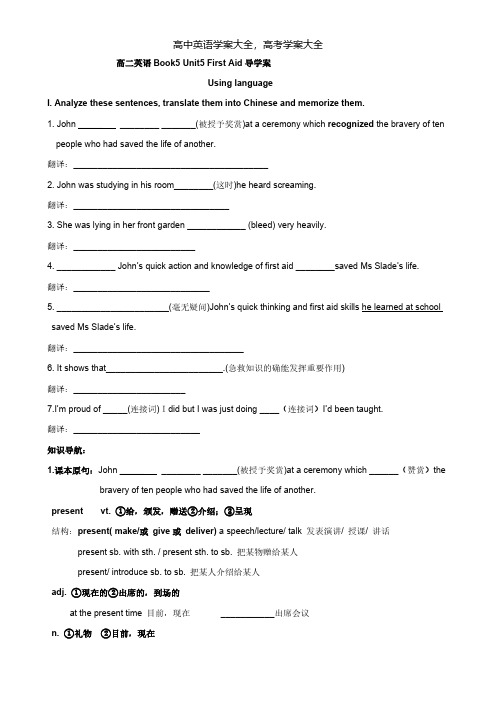
高二英语Book5 Unit5 First Aid导学案Using languageI. Analyze these sentences, translate them into Chinese and memorize them.1. John _____ ________ _______(被授予奖赏)at a ceremony which recognized the bravery of ten people who had saved the life of another.翻译:________________________________________2. John was studying in his room________(这时)he heard screaming.翻译:________________________________3. She was lying in her front garden ____________ (bleed) very heavily.翻译:_________________________4. ____________ John’s quick action and knowledge of first aid ________saved Ms Slade’s life.翻译:____________________________5. _______________________(毫无疑问)John’s quick thinking and first aid skills he learned at school saved Ms Slade’s life.翻译:___________________________________6. It shows that________________________.(急救知识的确能发挥重要作用)翻译:_______________________7.I’m proud of _____(连接词)Idid but I was just doing ____(连接词)I’d been taught.翻译:__________________________知识导航:1.课本原句:John _____ ________ _______(被授予奖赏)at a ceremony which ______(赞赏)thebravery of ten people who had saved the life of another.present vt. ①给,颁发,赠送②介绍;③呈现结构:present( make/或give或deliver) a speech/lecture/ talk 发表演讲/ 授课/ 讲话present sb. with sth. / present sth. to sb. 把某物赠给某人present/ introduce sb. to sb. 把某人介绍给某人adj. ①现在的②出席的,到场的at the present time 目前,现在___________出席会议n. ①礼物②目前,现在make a present of sth. to sb./ make sb. a present of sth. 把某物赠给某人at present目前,现在2. 课本原句:John ___________________________he heard screaming.John正在房间学习,这时突然听到尖叫声。
河北省临漳县第一中学高中英语 Unit 2 The Olympic Ga
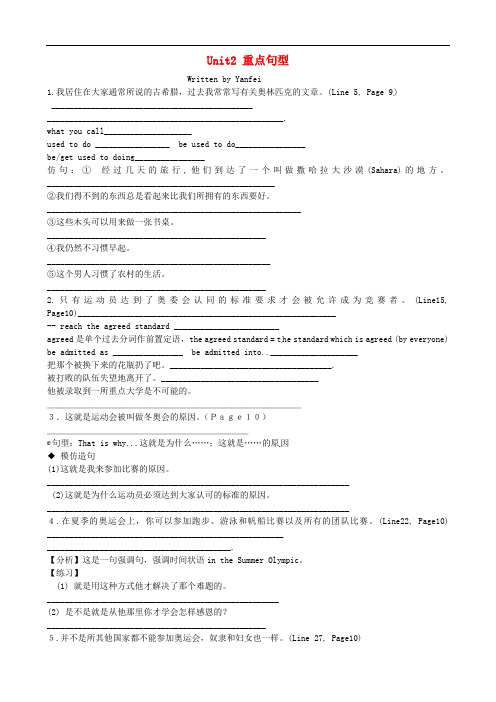
Unit2 重点句型Written by Yanfei1.我居住在大家通常所说的古希腊,过去我常常写有关奥林匹克的文章。
(Line 5, Page 9)____________________________________________________________________________________________________.what you call____________________used to do _________________ be used to do________________be/get used to doing________________仿句:①经过几天的旅行,他们到达了一个叫做撒哈拉大沙漠(Sahara)的地方。
____________________________________________________②我们得不到的东西总是看起来比我们所拥有的东西要好。
__________________________________________________________③这些木头可以用来做一张书桌。
__________________________________________________④我仍然不习惯早起。
___________________________________________________⑤这个男人习惯了农村的生活。
__________________________________________________2.只有运动员达到了奥委会认同的标准要求才会被允许成为竞赛者。
(Line15, Page10)___________________________________________________________-- reach the agreed standard ________________________agreed是单个过去分词作前置定语,the agreed standard = t he standard which is agreed (by everyone) be admitted as ________________ be admitted into..____________________把那个被换下来的花瓶扔了吧。
- 1、下载文档前请自行甄别文档内容的完整性,平台不提供额外的编辑、内容补充、找答案等附加服务。
- 2、"仅部分预览"的文档,不可在线预览部分如存在完整性等问题,可反馈申请退款(可完整预览的文档不适用该条件!)。
- 3、如文档侵犯您的权益,请联系客服反馈,我们会尽快为您处理(人工客服工作时间:9:00-18:30)。
Unit 5 Music
Words and expressions:
1. roll [rəul] vt. & vi. 滚动;摇摆n. 摇晃;卷;卷形物;面包圈
1) The dog is__________ on the ground.
2) The boy was eating a __________, which looks like very delicious.
2. dream of 梦见;梦想;设想(= dream about…)dream n. 梦想
短语:dream of/ about + sth./ doing梦想…向往…渴望…
1) I _________ _____ (梦想)being a great scientist when I was a child.
2) Many young people ______ ____going abroad.
3. _____ ______ ________ 实话说
be honest with sb对某人诚实be honest about sth对某事如实相告
1) 老实说,她不仅漂亮而且聪明______________________________________.
2) ---Michael is one of the top students in our class.
---__________, he cheated in the last exam.
A.On the other hand
B. Generally speaking
C. To be honest
D. Above all
4. attach vt .& vi. 系上,贴上,附加,连,附属于
短语:1)attach …to_____________________________________
1)attach importance/value/ to sth./doing.重视,看重(to是介词)
2)be attached to 附属于,依恋,对…有感情
Eg. I attach great importance to this research._____________________________ She is attached to her home.__________________
3) 他们认为教育很重要_______________________________________
5. ___________ vt.(使)组成;养成;形成;构成n.[C] 表格,形式
短语:to fill in/out a form__________; in the form of __________________ form the habit of __________________
Eg. 1)Group activities help to _____a child’s character.
2) __________ (养成)a good habit is important for everyone.
6.earn. Vt.____________
earn/make money挣钱earn sb +n.赢得(名誉、赞赏等)
earn(a) one’s living=make (a) one’s living 谋生
1) He ________about 3000dollars a year.
2) My brother _______his living by repairing cars.
7. perfom vi.& vt._______________ performance n.[C] performer n.[C]表演者
练习:1)When will the play be _________in the theatre in our city ?
2) The ___________ __________ so well, many people like his ____________.
那个表演者的表演太好了,许多人都喜欢他的表演。
8. cash n.[U]现金in cash 用现金pay sb. in cash 用现金付款by check 用支票
Eg. I have no __________(现金) with me. 我身上没带现金
Shall I pay for the computer __________(用现金)or by credit(用信用卡)?
9.________________________ 戏弄,开某人的玩笑= play a joke on
Eg. 1) Don’t ____________him. He is always serious.别开他玩笑,他总是很严肃.
2) The joke he played ______her was so funny that we couldn’t help ______.
A. with; laughing
B. on; to laugh
C. of; laugh
D. on; laughing
10. rely vi. ____________;rely on (upon) = depend on (upon) 依赖,依靠,指望
rely on sb./sth./doing…依赖…依靠… rely on sb. to do/doing指望/相信某人做…
Eg. 1) When you meet with some difficulties, you can _____ ___me for help.
2) Sometimes we may not _____ ___the weather report.
11.familiar. adj. _________________
sb. be/get familiar with sth._____________
sb./sth. be familiar to sb._______________________
Eg. 1) He is familiar __ English.他通晓英语.
2) His name is familiar ______many people. 她的名字为许多人所熟悉
12. _____________ 大约
1) He will live here for a week ______.
2)(05全国卷) My parents will move back into town in a year or____.
A .later B. after C. so D. about
13. break up ______________________
短语:break away from逃离break down 损坏,出故障,精神崩溃,失败
break into 破门而入break in 插话,打断break out 爆发,突然发生break off 中断停止
break the rule/ record/ promise违反规定/打破记录/失言have a break 休息一下
Eg. 1)Their friendship has_________________. 他们的友谊分裂了.
2).The computer system___suddenly while he was searching for information on the Internet.
A. broke down
B. broke out
C. broke up
D. broke in
14. in _________ =as well另外;也(in addition to=as well as除…之外,还有)
练习:1)You need time and money, ____________, you need diligence(努力).
2) ____ ________ ____English, the girl has to study a second foreign language.
3) Reading is a highly active process, for it requires attention. ______, it requires memory and imagination.
A. In addition
B. Otherwise
C. Or else
D. After all
15. sort out __________ all sorts of = all kinds of
Eg. We must _______ ______ (分类)the good eggs from the bad ones.
Would you mind _______ ____(整理)the books on the floor ?
16. ___________ 最重要的是;首先
Eg. Above all, make sure we keep in touch.____________________________。
